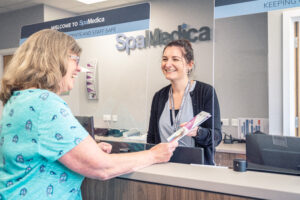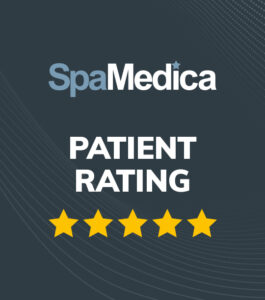Sheffield
6 Smithy Wood Drive, Chapeltown, Sheffield S35 1QN
6 Smithy Wood Drive, Chapeltown, Sheffield S35 1QN
Opening hours:
Mon to Sat 8:00 - 18:00
Tel: 0330 058 4280
SpaMedica Sheffield is a modern, state-of-the-art facility, which opened in October 2017. Our hospital facilities here are first-class and equipped with the latest technology.
We look forward to welcoming you to SpaMedica Sheffield. The team here will welcome you with a smile and answer any questions you have about your appointment or surgery.
Conditions we treat
Getting treatment
How to find us
The SpaMedica Hospital is located southeast of Chapeltown – follow the signs for the Smithy Wood Business Park, off the B6087. From M1 – exit at J35 and take the A629 to Cowley Hill, take the first left onto Cowley Way and at the roundabout take the second exit onto Smithy Wood Drive, take the first left into the business park and you will see the SpaMedica hospital in front of you. Turn left and park in the free car park to the left of the hospital.
If you require wheelchair assistance, please inform a member of staff upon your arrival at the hospital. Please note that all pre-assessment and post-operative appointments are on the first floor. There is a lift, which is accessible for wheelchairs, and this is located on the left hand side adjacent to the stairs.
There is a bus stop on Cowley Lane/Falding Street - this is a five-minute walk away for buses 135 and 135a. For more information, please visit www.travelsouthyorkshire.com
The nearest train station is Chapeltown and you can easily get a taxi from here to the hospital – it’s less than a five-minute drive. For train times/connections please call 03457 484950 or click here to visit the National Rail Journey Planner.
If you live in England, all you need to do is let your optician or GP know which healthcare provider and hospital location you would like to have your cataract treatment at, and they’ll send a referral to your chosen provider. You should hear back from your provider within two to three weeks following your referral. If you haven’t heard anything after this point, we recommend contacting the person who referred you—this will be your optician or GP—to check on the status of your referral.
Giving you local access to the highest standards of care. With over 61 hospitals nationwide, all rated 'Good' or 'Outstanding' by the Care Quality Commission, SpaMedica is the largest independent provider of NHS cataract treatment in the UK. Our experts will ensure you feel comfortable and confident from diagnosis to recovery. Having partnered with the NHS for over 15 years, we proudly support thousands of patients every month with ophthalmic conditions.
The only suitable treatment for cataracts is surgery. It is one of the safest surgeries you can have and is also the most common operation performed in the UK today, taking up to only 20 minutes for routine cases. The cloudy lens is removed and replaced with an artificial lens (implant). This is normally done under a local anaesthetic using eye drops to numb the eye.
Leave a review
Got a story to share? Let us know what you think by leaving us a review.
Frequently asked questions
Cataracts are a clouding of the lens in the eye which can cause blurry vision and difficulty seeing in low light conditions.
A Yag Laser Capsulotomy is a procedure used to treat a cloudy capsule behind the lens that may develop after cataract surgery. The laser creates a hole in the capsule to improve vision.
Common symptoms of cataracts include blurry or cloudy vision difficulty seeing at night sensitivity to glare and faded colors.


